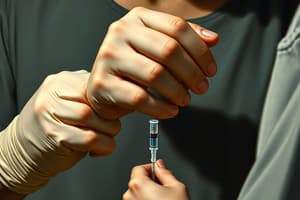Podcast
Questions and Answers
What is the preferred site for insulin injection due to its fastest absorption?
What is the preferred site for insulin injection due to its fastest absorption?
- Buttocks
- Abdomen (correct)
- Back of arms
- Thighs
What is lipoatrophy, a localized reaction to insulin injection?
What is lipoatrophy, a localized reaction to insulin injection?
- An allergic reaction to insulin
- A fibro-fatty mass at the injection site
- A loss of subcutaneous fat, appearing as slight dimpling (correct)
- A fatty mass at the injection site
What is a common cause of morning hyperglycemia?
What is a common cause of morning hyperglycemia?
- Hypoglycemia at night
- Resistant to injected insulin
- Insufficient level of insulin at night (correct)
- Overdose of insulin at breakfast
Why is it important to rotate insulin injection sites?
Why is it important to rotate insulin injection sites?
What is a potential problem with insulin therapy?
What is a potential problem with insulin therapy?
Why is oral administration of insulin not possible?
Why is oral administration of insulin not possible?
What is the purpose of self-monitoring of blood glucose?
What is the purpose of self-monitoring of blood glucose?
What should be avoided when storing insulin?
What should be avoided when storing insulin?
What is a consequence of uncontrolled blood glucose levels?
What is a consequence of uncontrolled blood glucose levels?
Why is patient training crucial in self-monitoring of blood glucose?
Why is patient training crucial in self-monitoring of blood glucose?
What is the significance of Lantus insulin?
What is the significance of Lantus insulin?
What is the common cause of hypoglycemia?
What is the common cause of hypoglycemia?
What are the three P's associated with gradual onset of hyperglycemia?
What are the three P's associated with gradual onset of hyperglycemia?
What is the characteristic of diabetic ketoacidosis?
What is the characteristic of diabetic ketoacidosis?
What is the blood glucose level considered abnormally low?
What is the blood glucose level considered abnormally low?
What is a symptom of hypoglycemia?
What is a symptom of hypoglycemia?
Flashcards are hidden until you start studying
Study Notes
Blood Glucose Monitoring
- Eat a snack at the end of exercise sessions and at bedtime to monitor blood glucose levels.
- Self-monitoring of blood glucose (SMBG) enables patients to make decisions about diet, exercise, and medication.
Insulin Therapy
- Exogenous insulin is required for type 1 diabetes and prescribed for type 2 diabetes patients who can't control blood glucose through other means.
- Types of insulin differ in onset, peak action, and duration, and are characterized as rapid-acting, short-acting, intermediate-acting, and long-acting.
- Insulin storage:
- Do not heat or freeze insulin.
- Lantus can only be stored for 28 days.
- Extra insulin should be refrigerated.
- Avoid exposure to direct sunlight or vigorous shaking.
- Insulin administration:
- Cannot be taken orally due to breakdown by digestive juices.
- Self-injection of insulin is necessary.
Acute Complications of Diabetes
- Hypoglycemia:
- Causes: too much insulin, missed medication doses, oral hypoglycemic agents, too little food, too much food, lack of physical activity, excessive physical activity.
- Symptoms: weakness, headache, hunger, diaphoresis, sweat, pallor, tachycardia, palpitations, tremors, nervousness, diplopia, numbness of lips and tongue, aphasia, vertigo, confusion, disorientation, loss of consciousness, and convulsions.
- Hyperglycemia/DKA:
- Causes: gradual onset, polyuria, polyphagia, polydipsia, glycosuria, dehydration, fever, hypokalemia, hyponatremia, acidosis, breakdown of fat into ketone bodies, mental changes, seizure, and coma.
- Symptoms of hypoglycemia and hyperglycemia:
- Abnormally low blood glucose level (below 50-60 mg/dL).
Insulin Injection Administration
- Abdomen is the preferred site for insulin injection due to fastest absorption.
- Other sites: back of arms, thighs, and buttocks, but with slower absorption.
- Rotate injections within one particular site to avoid problems.
- Avoid injecting in sites that will be exercised.
Problems with Insulin Therapy
- Hypoglycemia
- Allergic reactions
- Lipodystrophy:
- Lipoatrophy: loss of subcutaneous fat, appearing as slight dimpling of SC fat.
- Lipo-hypertrophy: fibro-fatty masses at the injection site, caused by repeated use of an injection site.
- Resistance to injected insulin: common with obesity, can be overcome by weight loss.
- Morning hyperglycemia: elevated blood glucose level in the morning, caused by an insufficient level of insulin.
Studying That Suits You
Use AI to generate personalized quizzes and flashcards to suit your learning preferences.




